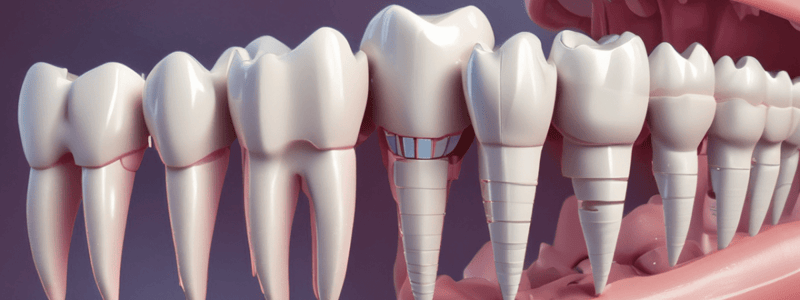Podcast
Questions and Answers
What is the recommended treatment for neuropraxia, a type of nerve injury?
What is the recommended treatment for neuropraxia, a type of nerve injury?
- Corticosteroids and non-steroidal anti-inflammatory drugs
- Microsurgery techniques to reestablish nerve continuity
- Removal of the offending element and oral administration of high doses of corticosteroids (correct)
- Topical application of dexamethasone for 1 or 2 minutes
What is the primary goal of microsurgery techniques in the treatment of nerve injuries?
What is the primary goal of microsurgery techniques in the treatment of nerve injuries?
- To control inflammatory reactions
- To enhance recovery with topical application of dexamethasone
- To prevent neuroma formation
- To reestablish nerve continuity (correct)
What is the most severe type of nerve injury?
What is the most severe type of nerve injury?
- Neurotmesis (correct)
- Hypoesthesia
- Neurapraxia
- Axonotmesis
Which of the following is a characteristic of neurotmesis, a type of nerve injury?
Which of the following is a characteristic of neurotmesis, a type of nerve injury?
What is the typical recovery time for axonotmesis?
What is the typical recovery time for axonotmesis?
What is the recommended course of action if a patient's situation has not improved after four months of nerve injury treatment?
What is the recommended course of action if a patient's situation has not improved after four months of nerve injury treatment?
Which of the following conditions is characterized by a complete loss of feeling?
Which of the following conditions is characterized by a complete loss of feeling?
What is the purpose of keeping the radiograph and calculation in the patient's chart?
What is the purpose of keeping the radiograph and calculation in the patient's chart?
What is the primary difference between neurapraxia and axonotmesis?
What is the primary difference between neurapraxia and axonotmesis?
Which of the following is NOT a type of nerve injury?
Which of the following is NOT a type of nerve injury?
What is the reported incidence of nerve lesions in patients undergoing dental implant surgery?
What is the reported incidence of nerve lesions in patients undergoing dental implant surgery?
Which of the following is a direct cause of nerve injury during dental implant surgery?
Which of the following is a direct cause of nerve injury during dental implant surgery?
Which nerve is most likely to be affected by compression of the implant body into the canal?
Which nerve is most likely to be affected by compression of the implant body into the canal?
What is the possible consequence of accidental intraneural injection during dental implant surgery?
What is the possible consequence of accidental intraneural injection during dental implant surgery?
What is the likely outcome of traumatic flap reflection during dental implant surgery?
What is the likely outcome of traumatic flap reflection during dental implant surgery?
What is the primary cause of bleeding in implant surgery?
What is the primary cause of bleeding in implant surgery?
What is the result of failed osseointegration?
What is the result of failed osseointegration?
What is a type of biologic complication in implant surgery?
What is a type of biologic complication in implant surgery?
What is the classification of complications in implant surgery according to Carranza?
What is the classification of complications in implant surgery according to Carranza?
What is the common complication that can occur in the lower and anterior area of totally edentulous patients?
What is the common complication that can occur in the lower and anterior area of totally edentulous patients?
Flashcards are hidden until you start studying




